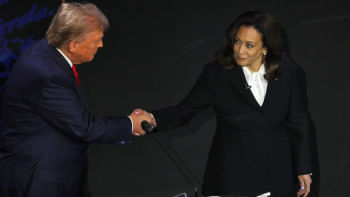The US goes red: Another round of Donald Trump

The night started off, as it does, with red states. But unlike 2020, there was no confusion. The percentage of votes counted quickly began to show a clear picture: Donald Trump's victory.
Trump won the presidency through the electoral system and the popular vote, which has not happened for any Republican candidate in the past two decades. He overperformed in several states, following the trends of the previous two elections that polls underestimated his voters. In three consecutive election cycles, pollsters did not manage to get a grip on Trump supporters. The media has engaged in many satirical theories, and eight years of incessant Trump bashing, all of which were incredibly damaging. The media willfully painted a picture divorced from the ground reality: mass support for Donald Trump and dissatisfaction with the Democrats. What's clear is that the US media and institutions in general need to figure out what can aptly be described as a shift to the far-right. No comparisons with Hitler, no cases, could stop him. Kamala Harris started off with an energetic campaign and fizzled out into the "Trump is a threat to US democracy" rhetoric, while the state of the economy and the approval rating for President Joe Biden continued to plummet. As it stands, both the US media and the Democratic party are out of touch with the majority of Americans.
In 2016, when Hilary Clinton lost, precisely the same way by losing the "Blue Wall"—Michigan, Pennsylvania and Wisconsin—the underlying reasons behind Trump's victory were not addressed. People cried and the analysis focused on the glass ceiling and Clinton's loss was penned on her gender. Doing so for this election would be the gravest mistake. While it could be true that Harris's gender has a part to play in her loss, it is well-known that Joe Biden would have lost against Trump as well, and he would've lost by higher margins. It is the economy, people wanted change and Harris offered the status quo. When asked in several interviews what Harris would change about the Biden-Harris administration, she reverted to her pride when she needed to drastically differ from her boss.
The early voter turnout—more than 80 million US citizens cast their votes before November 5—was high. As it happened in 2020, mail-in ballots proved to switch the game for Biden; we waited days as votes were being counted during the pandemic. The high turnout, especially early, when juxtaposed with the sheer number of votes for Donald Trump and the fact that he won the popular vote, is telling of the national sentiment in the US. It's easy to say Trump supporters are "delusional" and what not, but that will only maintain a bubble. Millions of people—educated men, women, people of color, young and Gen-Z voters—put Trump back in office.
It's incumbent on all of us to reconcile, as hard as it may be for some, with the fact that US politics has moved to a state of political vexation where individuals like Trump and Vance offer more appealing policies than the alternative. The US media, liberals, and the rest of the world must accept that reality. And there needs to be a shift from the currently redundant discourse on US politics. Trump bashing will get us nowhere. Trump's MAGA ideology represents the majority of the United States and that is the truth.
Kamala Harris underperformed in commonly Blue counties in the battleground states, where President Joe Biden, performed better in 2020. Now, this is not because Joe Biden is a White man. The problem with Harris' truncated campaign was Joe Biden to start with anyway—because had she run earlier and had she distanced herself from him, maybe she would have had a chance. Harris was not only dismissive of economic woes created by the current administration, but she also ran a centrist campaign in a polarised US, which failed miserably. In many ways, it seemed like a clever strategy on paper: reviving the John McCain and Mitt Romney type of Republican. But it should be clear now, that centrism is hardly reading the room in a country so polarised.
In North Carolina, for example, where Trump won, several counties shifted left while others shifted right, according to The New York Times. Standing in the middle ground, the classic case of trying to please every party undoubtedly played a role in Harris's disappointing performance in the elections. The strategies the Democrats have deployed in electioneering along with their policies should now be written off as outdated so that it can be changed for the future; the party effectively has no identity other than its anti-Trump messaging. It must be also noted that the Republican turnout machine—largely powered by allied conservative groups—focused on getting reliably conservative voters back to the polls for Trump. It worked.
Republicans took over the Senate, retaking the chamber for the first time in four years. The House is also poised to have a Republican majority. Everything, from the president-elect's policies on taxes to healthcare, will depend on the makeup of the two chambers of Congress. The Senate is solely responsible for confirming a president's cabinet officials and judges—from the federal, district and Supreme Court. Four of the nine justices—other than Trump's appointees—are in their 70s.
A Republican-led Senate would boost Trump's far-right presidency, and it was the only institution that provided the necessary logjams for Trump's loyalist tendencies and his "I can do whatever I want" mindset as the leader of a democratic nation. Though there are moderate voices in the Senate, including Senator Susan Collins of Maine, who was outspoken against Trump, this Senate is more likely to defer to him, who will be all the more recharged with a second term in the White House.
The implications for a Trump victory are far-reaching for the turbulent political atmosphere in the US and the rest of the world. Trump is an unpredictable man who openly favours loyalty over the country, yet he is still favoured by citizens and the reasons for that must be understood, rather than ridiculed. A second Trump term, along with the Republican sweep, essentially means we have entered a completely new era of US politics. With the re-election of Donald J. Trump, we should, and we need to accept that the United States, as a country, has fundamentally changed.
Ramisa Rob is in-charge of Geopolitical Insights at The Daily Star.
Views expressed in this article are the author's own.
Follow The Daily Star Opinion on Facebook for the latest opinions, commentaries and analyses by experts and professionals. To contribute your article or letter to The Daily Star Opinion, see our guidelines for submission.

 For all latest news, follow The Daily Star's Google News channel.
For all latest news, follow The Daily Star's Google News channel. 










Comments